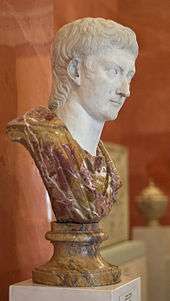Everard Fawkener
Sir Everard Fawkener (1694–1758) was an English merchant and diplomat.

Career
Fawkener was born into a family of silk merchants. His father, William (1642–1716) was a leading member of the Levant Company. Everard was sent out to Aleppo in 1716 and remained there until 1725. He then worked in the family firm of Snelling and Fawkener, leading Levant merchants of their day until 1735.[2]
It was probably in Paris, on his way home from Aleppo in 1725, that he met the philosopher Voltaire. He dedicated his tragedy Zaïre to Fawkener in 1733,[2] and earlier stayed in Fawkener's house in Wandsworth while in England.[3]
Fawkener was knighted in 1735, being appointed as ambassador to the Ottoman Empire on 19 August 1735. He arrived at Constantinople on 19 December. He did not like it much there and got leave to return home on 8 November 1742. His credentials were finally recalled on 4 September 1746.
Upon his return he became secretary to the Duke of Cumberland, a post which he held for the rest of his life. He accompanied the Duke on his campaign in the Scottish Highlands to suppress the 1745 Rebellion.[2] In 1745 postmaster general. In this period he was a financial backer in the foundation of the Chelsea Porcelain Manufactory.
Fawkener did not marry until 1747, when aged 53. His wife was Harriet, natural daughter of Lieutenant General Charles Churchill. A portrait of her by Constantinople-based artist Jean-Étienne Liotard hangs in Compton Verney House. They had a daughter and two sons,[2] William Augustus Fawkener [4] and Everard Fawkener of the 11th dragoons.
Fawkener lived at Westhorpe House near Little Marlow.[5]
References
- ↑ O. Neverov. "The Lyde Browne Collection and the History of Ancient Sculpture in the Hermitage Museum" American Journal of Archaeology 88.1 (January 1984:33-42) p. 39 and figs. 35, 36.
- 1 2 3 4 Haydn Mason, ‘Fawkener, Sir Everard (1694–1758)’, Oxford Dictionary of National Biography (Oxford University Press, Sept 2004; online edn, Jan 2008) , accessed 8 Aug 2008
- ↑ H. Mason, 'Voltaire and Sir Everard Fawkener', British Journal for Eighteenth-Century Studies, 23(1) (2000), 1-12.
- ↑ William Augustus Fawkener (c.1750-1811)
- ↑ "Parishes: Little Marlow, A History of the County of Buckingham: Volume 3 (1925), pp. 77-84". Retrieved 2 March 2014.
Further reading
- Perry, Norma. Sir Everard Fawkener, Friend and Correspondent of Voltaire
| Diplomatic posts | ||
|---|---|---|
| Preceded by The Earl of Kinnoull |
Ambassador to the Sublime Porte 1737-1744 |
Succeeded by Sir James Porter |
| Government offices | ||
| Preceded by Sir John Eyles The Earl of Leicester |
Postmaster General 1745-58 With: The Earl of Leicester |
Succeeded by The Lord Trevor The Earl of Bessborough |